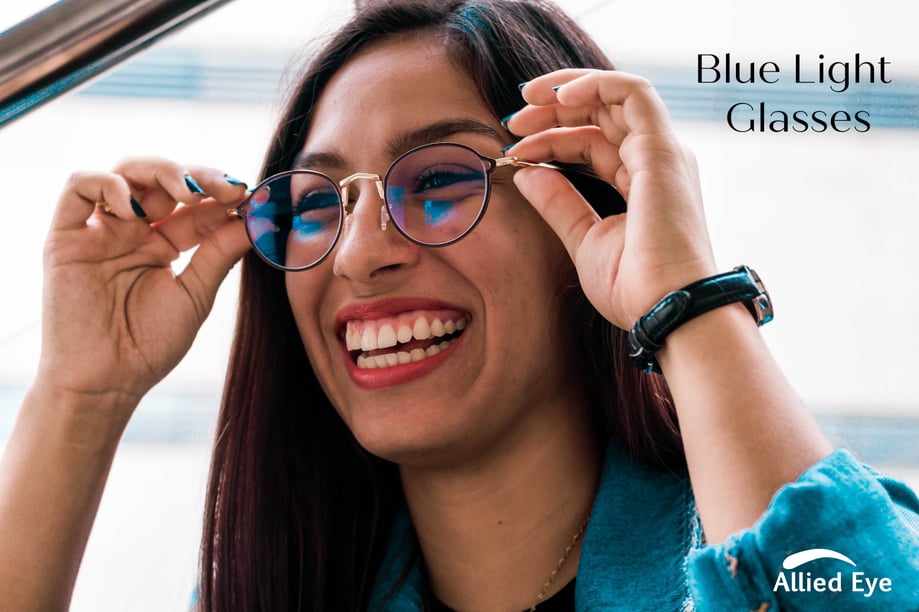
Protect Your Eyes | Blue Light Glasses
Blue light is everywhere. Not only is it produced by the sun, today’s computers, phones, tablets and TVs emit even brighter, short-wavelength blue light. Due to COVID-19 keeping most of us homebound, we’re in front of our screens more than ever. More time online may help us feel connected, but it’s not necessarily good for our eyes.
Blue light glasses can help protect your eyes from the negative effects of increased screen time. These glasses have special lenses to filter or block the high-energy light that streams from our devices. Benefits of wearing blue light glasses may include prevention of certain eye conditions, less eyestrain and improved sleep.
While ophthalmologists offer varying opinions about the effectiveness of blue light glasses, most agree that we need to lower our daily exposure to blue light. Keep reading to get answers to your most pressing questions about blue light glasses and learn about the protection offered by this special type of eyewear.
Why is blue light a problem when other types of light aren’t?
Blue light waves are part of the visible light spectrum humans see. The entire spectrum runs from red to violet and it’s emitted from the sun, light fixtures and screens. Blue light waves are helpful in that they make us feel awake and alert. Normal exposure to blue light isn’t a problem.
The trouble is, we are addicted to our screens. Many of us work in front of a computer for six to eight hours a day, then spend our free time on our phones. A 2019 study by the Pew Research Center found that nearly one-third of adults admit to being online almost constantly, while nearly half of those aged 18 to 29 say the same. That unnatural daily level of exposure to blue light can result in a great deal of eye strain and other problems—regardless of your age.
Can blue light damage my eyes?
While the science is still evolving on this topic, there is concern that too much blue light exposure may damage the retina over time. The retina is the area in the back of the eye that tells your brain what you are seeing. Damaging the retina’s light-sensitive cells leads to macular degeneration, a common cause of blindness. Scientists are studying the impact of blue light exposure and whether it speeds up this degenerative process.
Even if you don’t get enough blue light exposure to damage your retina, you are probably familiar with the uncomfortable eye strain caused by too much screen time. It’s important to give your eyes time to rest and recover when they feel tired; blue light glasses can help keep your eyes from tiring as quickly.
How does blue light interfere with my sleep routine?
One thing that scientists and ophthalmologists agree on is how excessive blue light exposure wreaks havoc on our sleep cycles. Before the invention of artificial light, our sleep schedules were regulated by the sun. Now, we can be exposed to bright light around the clock. This is a problem because our bodies are hard-wired to follow natural patterns of light and darkness.
The sun setting triggers our bodies to start making melatonin, a hormone that makes us feel drowsy. We need darkness to signal our bodies to prepare for sleep. In fact, blue light has such a powerful effect on our circadian rhythms that frequent flyers often use light masks to minimize the impact of jet lag.
Do blue light glasses really help? And when should I wear them?
Because the technology is fairly new, there aren’t many studies that prove or disprove the benefits of wearing blue light glasses. However, a study done by the University of Houston found that wearing the glasses could increase nighttime melatonin levels by 58 percent. Additionally, people who wear them usually give positive reviews, reporting better sleep and lower levels of eye strain and discomfort.
For the greatest benefit, you should wear your blue light glasses whenever you are online or watching TV. This is especially true if you must use your phone or computer after dark. You can add blue light blocking to your prescription glasses, or get nonprescription blue light glasses suitable for anyone. Unless you choose a type with amber or yellow lenses, you probably won’t notice any difference in your vision while you’re wearing blue light glasses.
What else can I do to protect my eyes from blue light?
Obviously, try to limit the amount of time you spend in front of screens each day. Perhaps go back to real printed books instead of relying on your Kindle or other digital reader. Put yourself and your kids on a screen-time diet, where you limit your scrolling to certain hours of the day. Other ways to cut back on overall exposure to blue light include:
- Wearing sunglasses and a hat when outdoors for long periods of time.
- Following a regular bedtime routine—even on the weekends—and turning off your screens an hour or two before you turn in.
- Setting your devices on “night mode” for use after dark.
- Using a matte screen filter to reduce glare.
The American Academy of Ophthalmology also recommends adopting the 20-20-20 rule: for every 20 minutes of screen time, look at an object at least 20 feet away for at least 20 seconds. If you find that you occasionally overdo screen time anyway, use artificial tears to soothe tired, strained eyes.
CAT & JAM | Ultimate Protection. Style Perfection.

Our Allied Optical Shop has created a new blue light eye wear brand called CAT & JAM ! This brand is a Non-RX option for individuals who want protection against harmful blue light caused by too much screen time. (RX options are also available in our Optical Shop). Elevate your style all while protecting your eyes against harmful blue light and UV. Stylish and Functional. Sweet! Come give our new page a like & follow. Our grand opening will be revealed, soon!
Allied Eye is Here for You!
At Allied Eye, we are taking every precaution possible to keep our patients and staff safe during this COVID-19 pandemic. We are still open to treat eye emergencies and eye injuries—and we now offer telemedicine. Please visit our COVID-19 page for updated information, including current hours of operation and how to access telemedicine services.
Sources:
https://www.cnet.com/how-to/what-are-blue-light-blocking-glasses/
https://www.webmd.com/eye-health/news/20191216/do-blue-light-glasses-work
https://www.pewresearch.org/fact-tank/2019/07/25/americans-going-online-almost-constantly/
https://www.webmd.com/eye-health/common-eye-problems#1
https://www.cnet.com/news/blue-light-from-phones-and-tablets-can-speed-up-blindness-study-finds/

